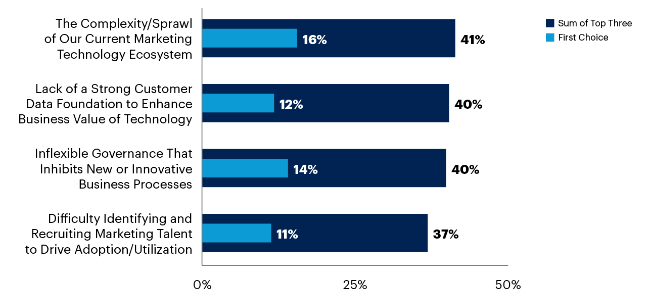Digital marketing is increasingly developing into data-driven marketing. The challenge here lies in the data protection-compliant collection of data (0- and 1st party data) via different channels, linking it and rule-based control of tailored and personalized messages on the appropriate customer channel, all in real time if possible. Modern AI-based solution architectures offer the perfect technological basis for this.
However, many companies ignore the fact that the use of current technologies does not automatically solve organizational and process-related problems but is merely a technical tool for managing and interpreting data. What should be done with the collected data and what communication measures are derived from it?
A clearly defined communication strategy provides the decisive strategic basis for establishing an understanding of the customer and the targeted and personalized communication measures derived from this. In many organizations, this represents a comprehensive paradigm shift. It is important that the resulting measures are not limited to marketing teams, but rather integrated into a cross-company CXM strategy. Organizational silos must be broken down and agile collaboration processes established across teams.
This change is highly individual and, depending on the organizational structure, cannot be implemented overnight. It is important to sharpen a fundamental understanding of overarching customer experience management (CXM) and based on this, to derive a road map with prioritized areas of action for your own organization.
What prevents many organizations from taking this path?
The strategic and procedural foundations for implementing a data-driven solution architecture are often lacking. Comprehensive marketing programs are not defined, measures are implemented ad hoc or without target definitions. Digital marketing does not mean sending a newsletter every month to a defined customer base that has given their consent. Every customer is valuable and has the potential for personalized approaches. Establishing a company-wide understanding of customers strengthens the measures required for organizational change. The methods and insights of Customer Experience Management (CXM) should be at the heart of any organizational alignment.
Many marketing teams still work in organizational channel silos without coordinating and working towards a common strategic marketing goal. In future, these rigid teams must be replaced by agile and overarching team structures that work together and across channels to fulfill the communication strategy through the active implementation of derived communication measures. Future-oriented and data-driven marketing therefore goes hand in hand with comprehensive organizational change management. The core of the measures should not only focus on the dissolution of classic data silos but should also simultaneously dissolve organizational silos and create consistent, agile collaboration structures.
Even Gartner considers the selection of new technologies without a prior strategy to be extremely critical. According to Gartner, “marketers tend to acquire new technologies without a systematic approach to their adoption.” Combined with multi-year contracts, underutilized or commissioned technology can easily lead to an unwieldy solution stack over time.

A successful and forward-thinking marketing organization should be customer centric. This means that different departments and teams work in a networked and agile way towards a common and clearly defined goal. Consistent and standardized collaboration, in which every step is transparent and clearly documented, is the basis for joint success.
What does success mean and who defines it?
A clearly defined CX strategy establishes fundamental and measurable success metrics from the outset. The focus here should be on acquiring new customers and increasing the satisfaction of existing customers, which now brings another team into play in the form of service.
Clear rules and objectives lay the foundations for dovetailing sales, marketing and service. This change should be implemented step by step with clearly defined milestones. Current technical solutions will help you to achieve your goals, but they must fit in with your defined milestones.
To summarize, it should be noted that most of the current trends are not new, but have been the basis of successful marketing for years, even if the terminology has changed and has been underpinned by powerful new technologies such as AI.
Even in the days of direct marketing, data was the decisive basis for marketing campaigns. However, data, even if it is stored in suitable and modern data platforms, is not automatically the basis for successful marketing campaigns. Data must be generated correctly and in compliance with data protection regulations, the right conclusions must be drawn from it and specific marketing measures that are suitable for the target group must be derived.
How do I collect data and what do I want to do with it?
This is where the first fundamental and strategic question begins, which many companies do not ask themselves.
The definition of a communication strategy and the fields of action derived from it for my organization form the decisive basis.
The purchase of a technical solution, such as a CDP platform or a campaign solution, does not mean that a strategy is automatically supplied with the solution. This must be defined in advance by each organization, preferably before selecting a solution, as this lays the decisive foundation for the development of a suitable marketing architecture. There are important steps to consider here, for which external expertise is extremely useful. To summarize briefly: First define your CX strategy and then decide which solution architecture fits your chosen strategy.
Do you want to make your organization fit for the future? Is CXM already an issue for your and do you need support in creating a CX roadmap?
Contact us for more information on this topic.
Related articles
Marketing Automation with Like Reply
Like Reply is a specialized expert in digital communication with offices in Munich, Milan and Paris. We support companies in the introduction and development of automated communication as well as in the systematic, effective management of leads and customer relationships. Contact us without obligation and find out how we can take the use of Marketing Automation to the next level together.


